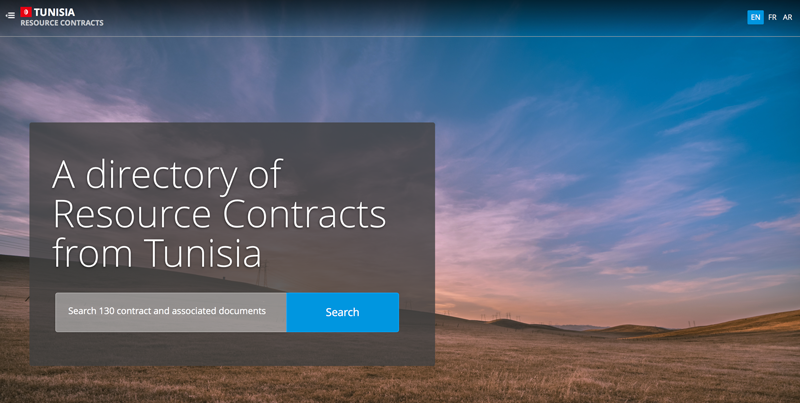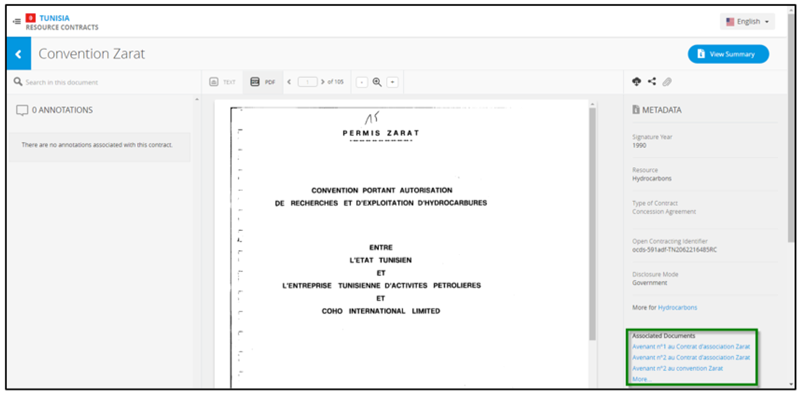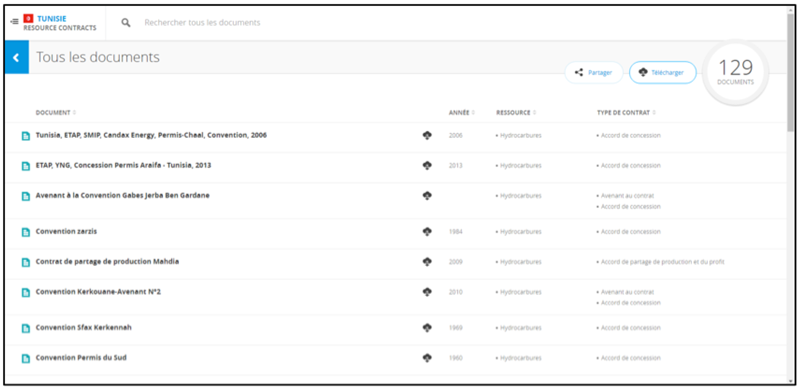
Tunisians Can Now Access Hydrocarbon Contracts in Open Data Format
The Natural Resource Governance Institute (NRGI), the Columbia Center on Sustainable Investment and the World Bank, in partnership with Tunisia’s Ministry of Energy, Mines and Renewable Energies, are implementing a ResourceContracts site for the publication of newly released hydrocarbon investment contracts and associated documents. On the new site, the documents are available as open data in a text-based format, and are therefore easily searchable. The contracts also come with comprehensive metadata. Plain language summaries (“annotations”), which contain key insights on each contract, will be added in the near future.
The project follows the decision in April 2016 by the former Minister of Energy and Mines, Mongi Marzouk, in response to appeals from civil society organizations for increased transparency around extractive industry projects, to publish more than 50 principal hydrocarbon investment contracts. This commitment to disclose extractive contracts was a critical step in promoting improved governance in Tunisia’s natural resources sector as well as an important move toward improving trust between the government, investors and extractive project-affected communities.
The Tunisian government also committed to joining the Extractive Industries Transparency Initiative (EITI), which is explicitly referenced in Tunisia’s forthcoming Open Government Partnership (OGP) national action plan. In the plan, joining the EITI is accorded the highest priority. Tunisia’s membership reinforces the importance of contract transparency for the country, given that the EITI Standard encourages member countries to publicly disclose extractive contracts.
The ResourceContracts platform will also assist the Tunisian government in achieving its commitment to improving contract transparency, made during the Anti-Corruption Summit held in London in May.
Over the past two years NRGI has supported Tunisia in a wide range of activities and technical assistance programs focusing not only on international transparency standards, the legal reform process (hydrocarbon code revision) and open data platforms, but also on developing a contract transparency strategy.
Tunisia’s ResourceContracts home pageAlthough hydrocarbon contracts had already been published on the government’s online data portal in portable document format (PDF), hosting these contracts on the ResourceContracts platform has many added benefits for users:
- PDF contracts are processed into machine-readable format using optical character recognition software.
- Metadata information relating to the country, company name, resource, signature date and the type of contract are listed for each contract.
- Users have access to advanced search functionality, and can search for contracts that were signed in a specific year, concern a specific resource or commodity, or were entered into by a specific company, among other categories.
- Contracts will be accompanied by annotations, which summarize the key environmental, social, operational, and fiscal terms of the contract, making it easier for a user to become quickly acquainted with a contract and to grasp complex issues without getting bogged down in confusing cross-references or having to flip between different pages.
- Functionality for comparing clauses of different contracts is provided.
- Other contracts and documents associated with a particular investment are linked to the main contract.
- The contracts are published with an open contracting identifier in accordance with the Open Contracting Data Standard.
The Tunisian ResourceContracts country site currently contains 129 hydrocarbon documents, which include 55 main investor-state contracts and 74 associated documents. As a next step, contracts will be annotated in French. This will be followed by workshops for Tunisian civil society organizations focusing on using the site, and on analyzing investment contracts. The site’s main functionalities are available in English, French and Arabic.
A hydrocarbon contract on the Tunisia ResourceContracts site. Associated documents are listed in the area highlighted by the green box. (Click to enlarge.)
A list of some of the contracts available on the Tunisia ResourceContracts page. (Click to enlarge.)
It is anticipated that mining contracts will also be published on the site in the near future.
About ResourceContracts
The ResourceContracts platform is an online repository of oil, gas and mining contracts developed in partnership between the World Bank, NRGI and the Columbia Center on Sustainable Investment. The site enables civil society organizations, members of affected communities, government officials, researchers, and other stakeholders to search for contracts; view summaries of contracts’ key environmental, social, operational and fiscal provisions; and download full contracts as open data. The site was re-launched in 2015 with new features and contracts.
The partners behind ResourceContracts continue to work with governments and country-level EITI offices to publish extractives contracts as open data. Tunisia is the fourth country to establish a ResourceContracts country site, following Guinea (2013), the Philippines (2015) and Sierra Leone (2016).
Wissem Heni is NRGI’s Tunisia program officer. Anders Pedersen is acting manager of data projects at NRGI. Rob Pitman is a governance officer at NRGI. Sam Szoke-Burke is a legal researcher for the Columbia Center on Sustainable Investment. Charles Young is a technical consultant working with NRGI.




